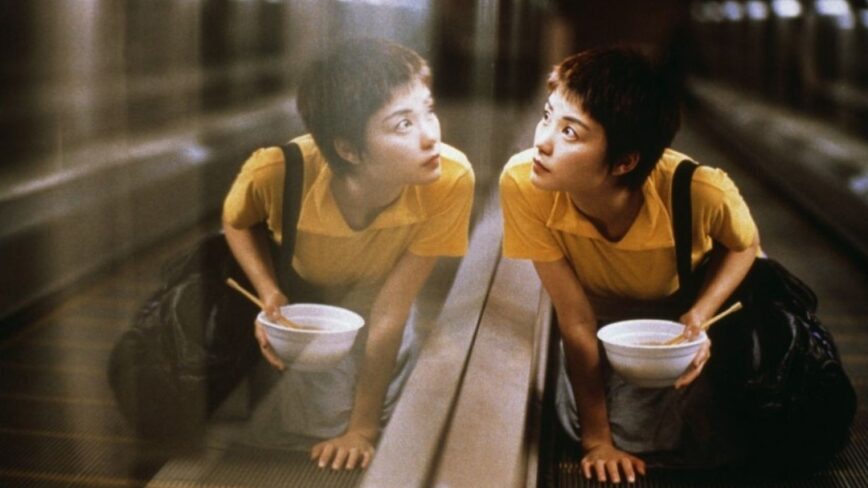I’ve been winding my way through the recently-release World of Wong Kar Wai box set, and on re-watching Chungking Express, was reminded that I always meant to do a proper deep dive into the mid-90s relationship between Faye Wong and the Cocteau Twins, two artists who wouldn’t seem to have anything in common – one a legendary Chinese singer-actress megastar, the other a trio of Scottish dreampop architects – but they actually worked together for some years, resulting in some gorgeous tunes.
In addition to the cover of The Cranberries’ “Dreams”, which is probably Wong’s most well-known foray into western alternative rock, the Chungking Express soundtrack also included a song called “Know Oneself and Each Other” (“胡思亂想”) which from the first shimmering chords is obviously “Bluebeard”, from Four Calendar Cafe, and Wong’s 1994 album 胡思亂想 (Random Thoughts) also featured her take on another Cafe song, “知己知彼”, or album opener “Know Who You Are at Every Age”.
At this point, contact was made between Wong’s people and the Cocteaus’ people and they began collaborating, albeit slowly – after all, this was the mid-90s and creating online was still essentially science-fiction. Robin Guthrie and Simon Raymonde discussed it during an interview with the BBC’s Mark Radcliffe in 1996:
In a 2018 interview with The Quietus, Raymonde reflected on the collaborations:
“Faye was a big fan of the band and had asked her label – a Universal label I think it must have been – to try and contact us. We liked her in that Wong Kar-Wai film Chunking Express and thought it might be a fun thing to do, as her voice seemed to be in a similar range and style to Elizabeth’s. We never worked with her directly in the studio; it was all done through interpreters and she recorded her parts in Hong Kong and Beijing.”
“We continued to work with her on her own next album which wasn’t her most successful as she moved from singing more conventionally to a more wordless style which didn’t go down as well in China, but Robin and I carried on writing music for her. She might have helped our name get a bit better known there, but I don’t think we helped her much. I think it was an interesting collaboration and while it probably didn’t work out as we might have imagined, I think musically and sonically it all worked out fine”
– Simon Raymonde to The Quietus
The Strange World of… Cocteau Twins @ The Quietus
And this past February he talked to Little White Lies, along with Cranberries guitarist Noel Hogan, about, that moment when western dream-pop took hold in Hong Kong, thanks to Wong:
How Chungking Express brought dream pop to Hong Kong @ Little White Lies
As for the complete Faye Wong/Cocteau Twins discography, as I’ve gathered it runs rather like this:
As noted above, Wong’s 1994 album 胡思亂想 (Random Thoughts) included a pair of Four Calendar Cafe songs – “Bluebeard” re-named as “胡思亂想” (“Know Oneself and Each Other”) and “知己知彼”, or album opener “Know Who You Are at Every Age”. It also had The Cranberries’ “Dreams”, so quite an introduction.
The Cocteaus co-writes found their way onto her 1996 record 浮躁 (Restless or Anxiety). “分裂” (“Fracture” or “Divide”) and “掃興” are (“Repressing Happiness”) credited to Guthrie/Fraser/Raymonde, and the Cocteaus would find themselves in the curious position of covering their own compositions when they re-recorded the songs in English for their own releases. The former became “Tranquil Eye”, a b-side on 1996’s Violaine, and the latter became “Touch Upon Touch”, emerging on a proper release only in 2018 on the Fontana-era compilation Treasure Hiding.
Wong and Fraser both sang on a special version of “Serpentskirt”, which replaced the regular album version on the Hong Kong release of Milk & Kisses.
The Cocteaus content would continue for one more record, Wong’s 1997 self-titled 王菲. On that record “懷念” (“Nostalgia”) is a cover of the acoustic version of Milk & Kisses‘ “Rilkean Heart” that appeared on the band’s 1995 Twinlights EP. Interestingly, the live performance of song below goes back to the original electric arrangement… and is also in English. In addition, the record contained one more Cocteaus original composition, the moody “娛樂場” (“The Amusement Park”), which was never re-done by the Cocteaus.
And just for completeness:

